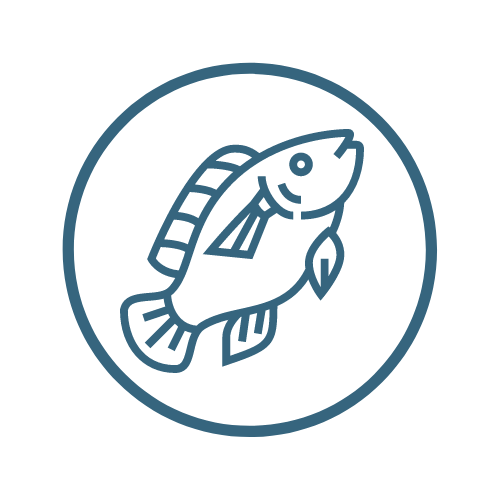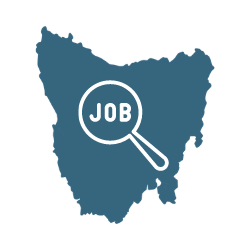Aquaculture
Salmon, oysters, mussels, abalone, seahorses and seaweeds – aquaculture is an important industry in Tasmania.

aquaculture
Industry Overview
Tasmania accounts for more than half of Australia’s sustainable aquaculture exports.
Aquaculture is the science that studies how to cultivate:
- fish (such as salmon),
- crustaceans (such as shrimp and lobster),
- mollusks (such as octopus and squid),
- algae, and other organisms that live in aquatic environments (DPIPWE 2020).
The Tasmanian aquaculture industry includes:
- Rock, lobster, abalone, scalefish
- Giant crab and octopus
- Southern and Eastern scalefish and shark
- Southern and Eastern scalefish and shark
- The Bass Strait central zone scallop, Southern squid jig, salmonids, oysters, abalone, mussels
Tasmanian data
In 2019 the first report of the economic contribution of aquaculture to Tasmania was published citing a total of 8,803 full-time equivalent (FTE) jobs, specifically:
- 2 987 aquaculture jobs
- 423 sea food processing jobs
- 5 393 FTE jobs contributed indirectly by the needs of the industry such as administration, research and road transport.
The top three contributors to gross value in Tasmania in 2017/18 was salmon farming (76%), fisheries (16%), and seafood processing (7%). The industry produced a total of $1 182 million dollars of value.
Australian data
Nationally, the industry has experienced a dip due to demand and distribution disruptions throughout the pandemic. The Department of Agriculture has published a 2023 industry outlook for projections for the recovery.

aquaculture
Qualifications
Qualifications can open up opportunities for skilled positions working directly in aquaculture, or indirectly in a job that supports the industry.
However you can start as a farm hand and learn on the job without a qualification.
Examples of jobs with no qualifications
- Seafood Processors – sea urchin roe and abalone
- Truck Driver and General Hand – loading and unloading, factory cleaning and maintenance.
- Truck Driver – provide pick up, load, transport and unload of live fish.
Vocational qualifications
The following vocational qualifications can be obtained in Tasmania.
- Cert I Seafood Industry (preparation for work in the industry)
- Cert II Aquaculture (support the care of aquatic stock)
- Cert III Aquaculture (attend to aquatic stock)
- Cert IV Aquaculture Supervisor (supervisor jobs)
- Diploma of Aquaculture (management jobs)
- Aquaculture Diving Skill Set (diving safely)
More information at Career Institute MySkills.
Tertiary qualifications
At UTAS there is an Associate Degree in Applied Science, specialising in Sustainable Aquaculture.
There is also a Bachelor of Marine and Antarctic Science with a major in Sustainable Aquaculture that is done in Launceston.

aquaculture
Career Development
Relevant certificates
- Forklift licence provided by Registered Training Organisation’s like TasTAFE.
- First aid certificate provided by Registered Training Organisation’s like Red Cross.
- Bronze medallion provided by the Royal Life Saving Australia.
- Cockswains certificate is about safe boating.
Skills for workers
Tasmanian Seafood and Marine Training offers courses for aquaculture workers.
Skills for Researchers
Australian Maritime Sciences Association is a member organisation of scientists and researchers that delivers professional development.
The Research, Technology, and Innovation (SINTEF 2021) has a mini-seminar to learn more about the state and future solutions for autonomous aquaculture.

aquaculture
Networking
Relevant Network:
- The Network of Aquaculture Centres in Asia-Pacific is a regional aquaculture research and development network.
- IntraFish is a free newsletter that has led the world in seafood, fisheries, and aquaculture news and business intelligence for over 20 years.
- Salmon Eye is a centre for learning and discussion about the possibilities for a sustainable way of fish farming.
- Global Aquaculture Alliance is a community for members to promote responsible aquaculture practices through education, advocacy, and demonstration.
- World Aquaculture Society is a community of members. Membership in WAS connects aquaculturists with their colleagues worldwide through meetings, publications, and the online Membership Directory.
Subscribe to industry information
- Australian Maritime Safety Authority newsletters and magazine.
Industry membership
- World Aquaculture Society for trade magazine, journal, conferences, and Youtube.
- IntraFish news archive. Full access to IntraFish with several plans for each member preference.
- Global Aquaculture Alliance Membership. GAA Members receive exclusive benefits, production data, and more.
Industry on Facebook
- Tasmanian Aquaculture Reform Alliance (Facebook Group) Promote discussion between industry, government, and the community on aquaculture.
- Aquaculture News and New Ideas. (Facebook Group) Is a group where you can post questions, photos, articles, anything about new information on aquaculture.
- Primary Employers Tasmania supports the business and workforce in the aquaculture industry. (Facebook Page)

aquaculture
What Employers Want
Availability
Some fisheries operate all year round, other parts of the industry are seasonal and active over summer months. Because catching fish is dictated by weather patterns, there is often overtime and weekend work increasing take home pay.
These are skills needed:
- The ability to work in a fast-paced environment, and remain focused whilst performing repetitive tasks.
- Knowledge of biology
- To be thorough and pay attention to detail
- The ability to work well with others
- Patience and the ability to remain calm in stressful situations
- The ability to use your initiative
- The ability to work well with your hands
- Business management skills
- Excellent verbal communication skills
- To be able to carry out basic tasks on a computer or hand-held device
- You may need a full driving licence to travel to work, collect feed and equipment, and make deliveries to local buyers (JOBOUTLOOK 2020)
The aquaculture industry has more than the average:
- Full time positions (79% full time roles compared to average of 66%)
- Hour per week (49 hours per week compared to average 44 hours)
- Men (15% female in aquaculture compared to 48% across all industries)
- Age (industry average 45, compared to total industry average of 40 years) (JOBOUTLOOK ANZSCO ID 1211)
Health
- Aquaculture farm work is physically demanding and employers often require a physical assessment with a physiotherapist.
- An Australian Maritime Safety Authority medical fitness certificate demonstrates that you’re fit to work at sea (AMSA 559).
Safety
- Employers often require a medical and drug screening ensure reliable and safe staff.
- A nationally recognised first aid certificate is valuable.
- Water safety skills such as a bronze medallion could be valuable.
- Operating vehicles, forklift, boat or tractor require licence and/ or safety procedures.
Job advertisements highlight some employer questions to prepare for:
- Which of the following statements best describes your right to work in Australia?
- Do you have a current Australian driver’s licence?
- Are you willing to undergo a pre-employment medical check?
- Are you willing to undergo pre-employment drug and alcohol screening?
- Are you available to work outside your usual hours when required? (e.g. weekends, evenings, public holidays)
- Are you willing to relocate for this role
- Have you worked in a role that requires a sound understanding of OH&S/WH?(SEEK 2021)

aquaculture
Finding Jobs in Tasmania
Fishing and aquaculture jobs according to regions
- South East – offshore caged aquaculture (salmon)
- West, North East and North West – fishing and offshore longline /rack aquaculture.
Oyster farm locations in Tasmania
- Pipe Clay Lagoon
- Marion Bay
- Duck Bay
- Island Inlet
- Pitt Water
- Little Swanport
Newspapers
- The Advocate (North West Tasmania)
- The Examiner (North Tasmania)
- The Mercury (South Tasmania)
Tasmanian companies
Online
- Career One and Indeed and Jora source jobs from other places so sometimes you find something new.
- Gumtree Jobs is a community job board often for more entry level positions which could help get experience for another position.
- Job Active is the Australian Government job board curating jobs from many sources.
- Seek jobs can have search alerts by location for Farming, Animals, and Conservation jobs.
- Tasmanian Government Jobs may have positions with the Department of Primary Industries, Parks, Water, and Environment.

aquaculture
Job Seekers Tips
Job Seekers Tips
- See the videos: The Future of Seafood – Full Episode
- Farming the Sea – Full Episode
- Understand the industry safety profile published by WorkSafeTasmania.
Safety skills
- Ability to swim may be important
- Understand the importance of personal protective equipment (PPE) such as waders, wader protectors, gumboots, sunglasses, sun hats, beanies, wet weather jacket and pants, high-vis vest, gloves, sun screen, wet suit (if required) and ear muffs.
Sustainable oceans
- The United Nations Sustainable Development Goal 14 is to conserve and sustainably use the ocean, sea and marine resources.
- Landcare Tasmania has volunteer groups that focus on the coast and water ways.

aquaculture
Acknowledgements
The Migrant Network acknowledges the invaluable input from the industry.
Contributors and reviewers of this Aquacultural Insights page:
“Thank you for the opportunity and congratulations for this beautiful project sharing other people’s experience!” Skilled migrant, 19 April 2021.
Tell us what you think
About MRC Tas
Migrant Resource Centre Tasmania (MRC Tas) is a not-for-profit organisation that has been supporting people from migrant and humanitarian backgrounds to settle successfully in Tasmania since 1979.
MRC Tas
Linkedin
Facebook-f
Globe
Soundcloud
About Migrant network tasmania
Migrant Network Tasmania draws on the goodwill, stories and tips of migrants and the wider community to help fellow migrants to establish lives and careers in Tasmania.
